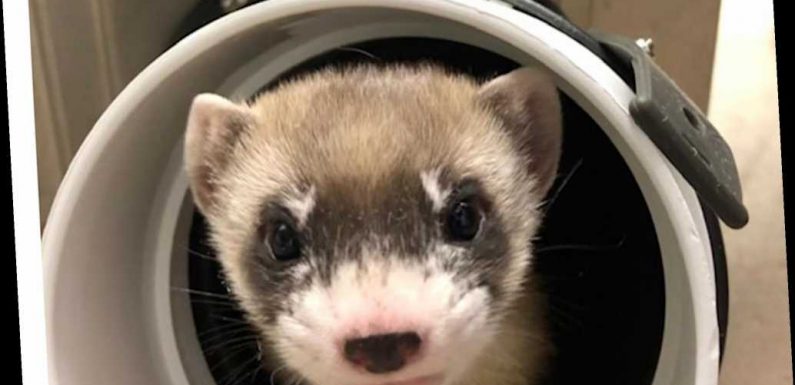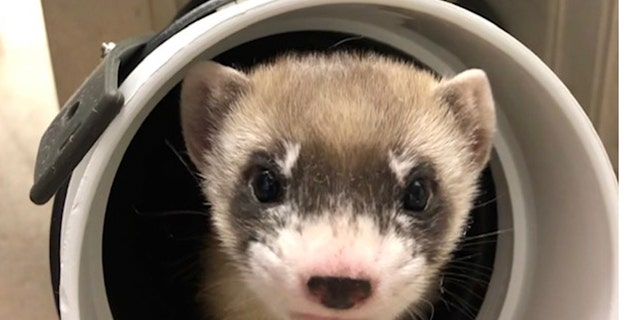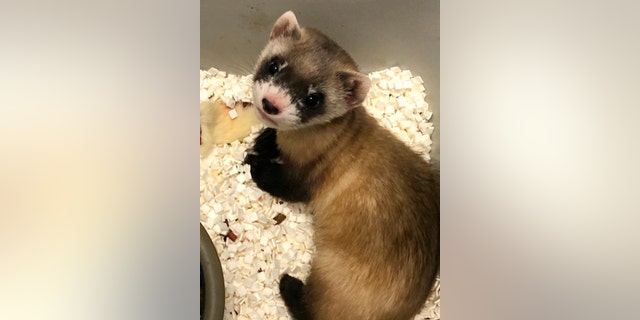
Fox News Flash top headlines for February 18
Fox News Flash top headlines are here. Check out what’s clicking on Foxnews.com.
Scientists announced the first successful cloning of a U.S. endangered species: a black-footed ferret.
The animal, named Elizabeth Ann, was born Dec. 10 and announced Thursday. Willa, the ferret who served as the genetic source for Elizabeth Ann, died in 1988 and remained frozen as cloning research was just getting underway.
The success gives conservationists hope to see other species returned to the wild, though the process will require patience. The process required the use of a tame domestic ferret, and a second clone did not survive.

In this photo provided by the U.S. Fish and Wildlife Service is Elizabeth Ann, the first cloned black-footed ferret and first-ever cloned U.S. endangered species, at 50 days old on Jan. 29, 2021. Scientists have cloned the first U.S. endangered species, a black-footed ferret duplicated from the genes of an animal that died over 30 years ago. They hope the slinky predator named Elizabeth Ann and her descendants will improve the genetic diversity of a species once thought extinct but bred in captivity and reintroduced successfully to the wild. (U.S. Fish and Wildlife Service via AP)
Other species that could benefit from cloning include a Mongolian wild horse, which was cloned and last summer born at a Texas facility, and the extinct passenger pigeon.
“Biotechnology and genomic data can really make a difference on the ground with conservation efforts,” said Ben Novak, lead scientist with Revive & Restore, a biotechnology-focused conservation nonprofit that coordinated the ferret and horse clonings.
‘BUILDING BLOCKS OF LIFE EXIST’ ON MARS, FORMER NASA ADMINISTRATOR CONFIRMS
Black-footed ferrets are a type of weasel easily recognized by dark eye markings resembling a robber’s mask. Charismatic and nocturnal, they feed exclusively on prairie dogs while living in the midst of the rodents’ sometimes vast burrow colonies.
The lack of genetic diversity is a concern for scientists, however: Genetic similarity would make the new ferrets potentially susceptible to intestinal parasites and diseases such as sylvatic plague.

In this photo provided by the U.S. Fish and Wildlife Service is Elizabeth Ann, the first cloned black-footed ferret and first-ever cloned U.S. endangered species, at 48 days old on Jan. 27, 2021. Scientists have cloned the first U.S. endangered species, a black-footed ferret duplicated from the genes of an animal that died over 30 years ago. They hope the slinky predator named Elizabeth Ann and her descendants will improve the genetic diversity of a species once thought extinct but bred in captivity and reintroduced successfully to the wild. (U.S. Fish and Wildlife Service via AP)
When Willa died, the Wyoming Game and Fish Department sent her tissues to a “frozen zoo” run by San Diego Zoo Global that maintains cells from more than 1,100 species and subspecies worldwide. Eventually, scientists may be able to modify those genes to help cloned animals survive.
“With these cloning techniques, you can basically freeze time and regenerate those cells,” Gober said. “We’re far from it now as far as tinkering with the genome to confer any genetic resistance, but that’s a possibility in the future.”
CLICK HERE TO GET THE FOX NEWS APP
A Fish and Wildlife Service black-footed ferret breeding facility in Fort Collins, Colo., is taking care of Elizabeth Ann.
The Associated Press contributed to this report.
Source: Read Full Article
